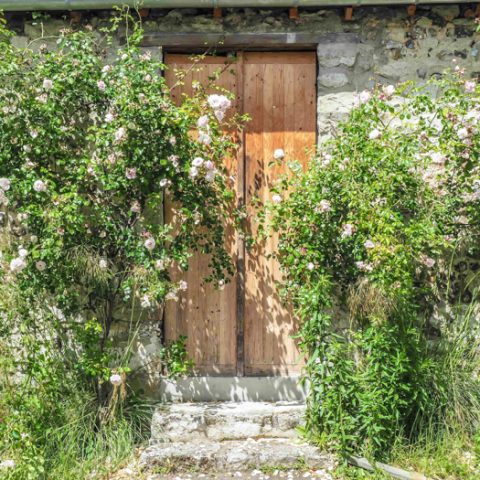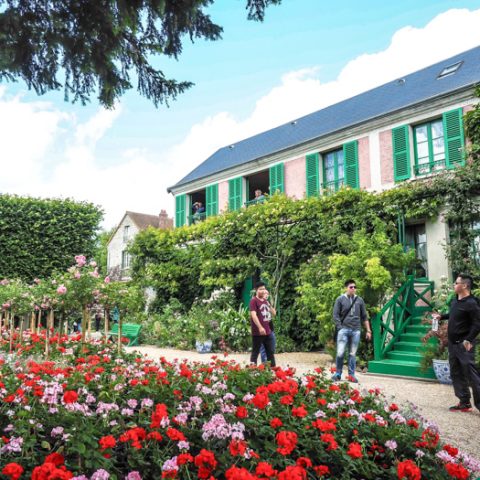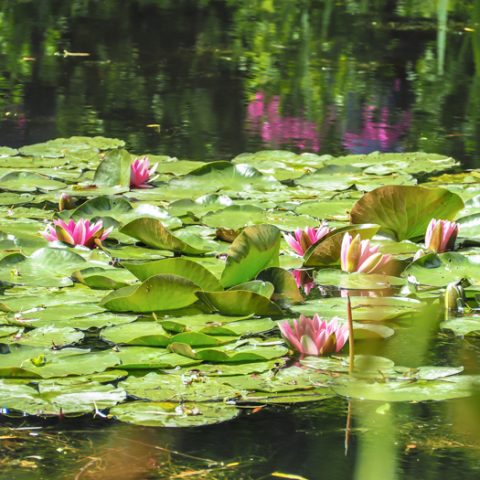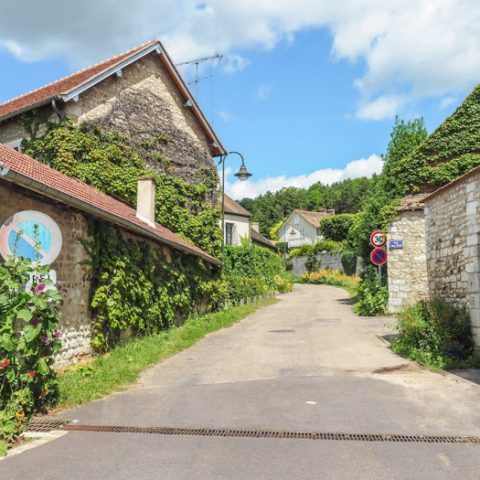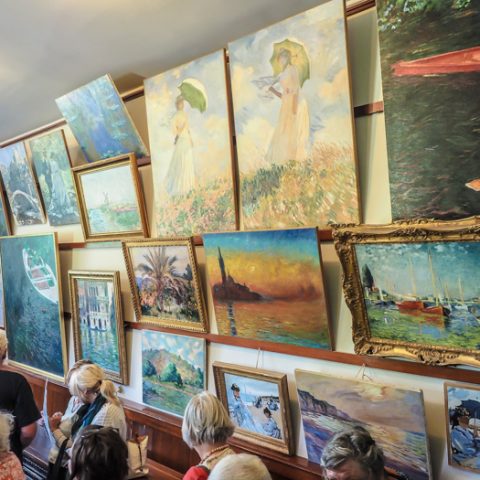This day trip to Giverny is another example of my biggest piece of French advice: one thing I always tell people to do when visiting Paris is… leave it. Just get out. *Gasp*
Alright, alright, calm down. Paris is what it is (magic and romantic and crawling with delicious snails that actually aren’t anymore) but the France outside of Paris is, believe it or not, EVEN BETTER.
On the second of my two trips to France last year I toured all over:
- Paris and Versailles
- the Loire Valley
- Mont-St-Michel
- the D-Day sites of Normandy
- Giverny
- and every sickeningly lavish chateaux in between.
I did all of this with my friend and faithful travel companion who is, of all things, an art teacher. But while she can appreciate brushwork, composition, and whatever ”diptych“ is, I’m more into snooping around in the former homes of famous people, because I’m creepy like that.
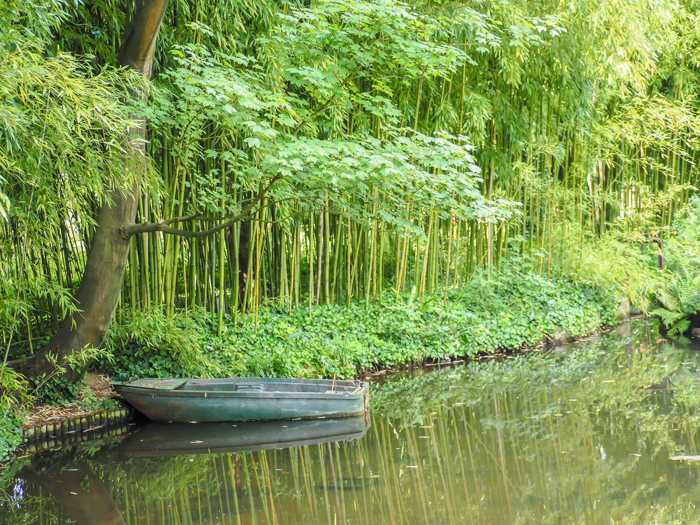
Why take a day trip to Giverny?
One such reason to leave Paris is for a day trip to Giverny, the tiny village that was once home to impressionist mastermind Claude Monet. Now replace “home” with “resting place” and that’s just one of the reasons to visit.
Besides getting to tour Monet’s personal home, on a Giverny day trip you also get the chance to walk all through his gardens, visit his studio, and circle his water lily pond. Like, the Water Lilies water lily pond. Even for someone on the Microsoft Paint level of the artistic ability spectrum, it’s a pretty impressive experience.

Is Giverny worth visiting?
If you’re a lover of art history, fine art, or even just flowers and gardening, then Giverny is absolutely worth visiting. The property, gardens, and lily pond are meticulously well-kept and the experience of visiting is a quality one.
You get to see so much on a visit to Giverny and every month it’s open offers something different in terms of blooms. You’ll also get to learn about Monet and his paintings and see how he lived.
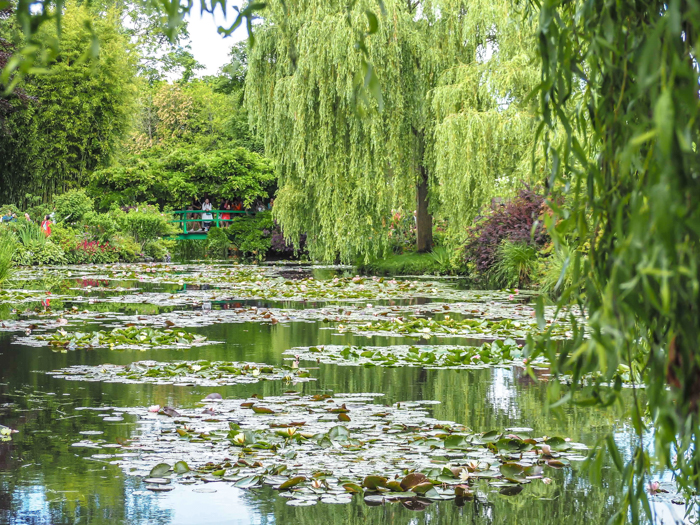
How long do you need at Monet’s Giverny?
Three to four hours would be a good amount of time for a visit of Monet’s Giverny. Walking around the lily pond and through the gardens will take a good chunk of time. And the rest will be spent touring his home (which tends to get crowded and therefore slow moving) and studio and checking out the gift shop.
If you like floral day trips, definitely check out my post on a day trip to Keukenhof–the world famous tulip gardens outside Amsterdam.

The history of Monet and Giverny
Claude Monet was the founder of French impressionist painting and, by all accounts, the original hipster. Impressionism was the 19th century art movement that emphasized light, movement, visible brush strokes, and blatant rule-breaking. Boy were those fancy pants art critics pissed at him.
He also, probably, played a major part in pairing a bushy beard with a beret—a style statement you still see so often in and around craft breweries and artisanal vegan donut/bicycle shops.
Looking for more interesting day trips from Paris? Check out these best Normandy tours from Paris for some unforgettable WWII history.
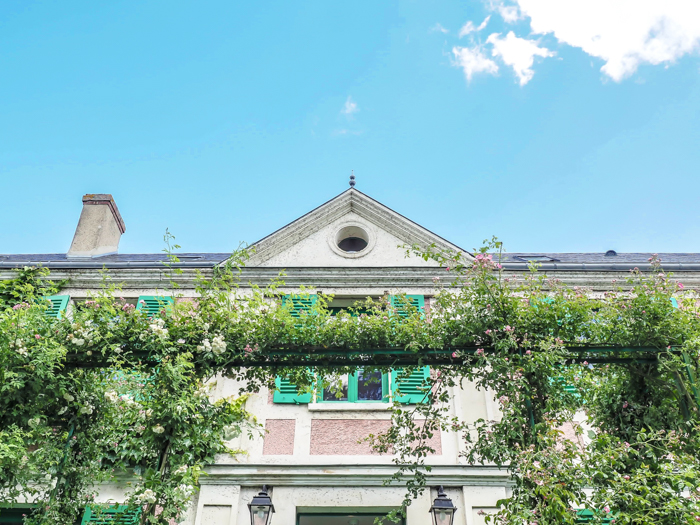
In 1883, Monet moved to Giverny (pronounced “Zzshee-vairrrrr-nee” – no really, listen), a picturesque village he once saw from a moving train. [Picture any photo on Instagram of a person staring longingly out a train window, here.]
Giverny is an hour outside Paris in 21st century time but much longer by 1800s standards. I’m just saying, he didn’t have that beard when he left.
Monet lived in Giverny for exactly half of his life, until his death in 1926. It was while he lived here that he painted his entire Water Lilies series, the works he’s most famous for, even long after he developed cataracts. I got lightheaded from standing up too fast yesterday and couldn’t work for a good 20 minutes. Just saying.
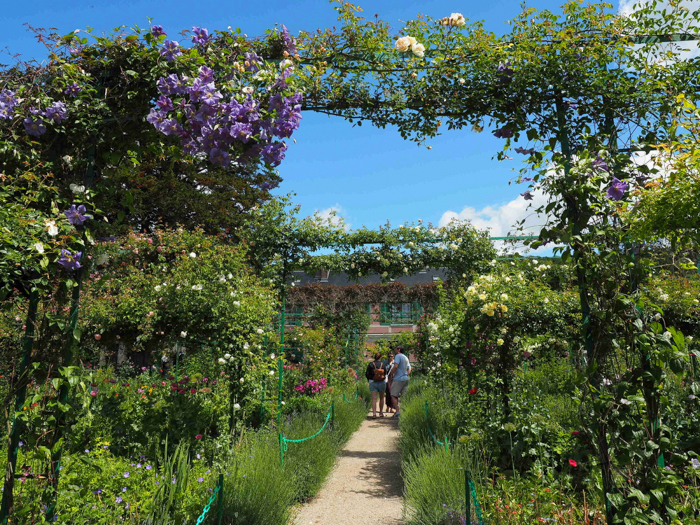
Giverny and Water Lilies
Water Lilies—you know what it looks like—is a series of around 250 oil paintings of the water lily pond behind his house at Giverny. Monet was big into doing series work—not unlike Kelsey Grammer or Mariska Hargitay—and has done many others including Haystacks, Rouen Cathedral, and Houses of Parliament.
Throughout his life and especially after moving to Giverny, Monet was obsessed with gardening, the same way I’m obsessed with not gardening (somebody feed me).
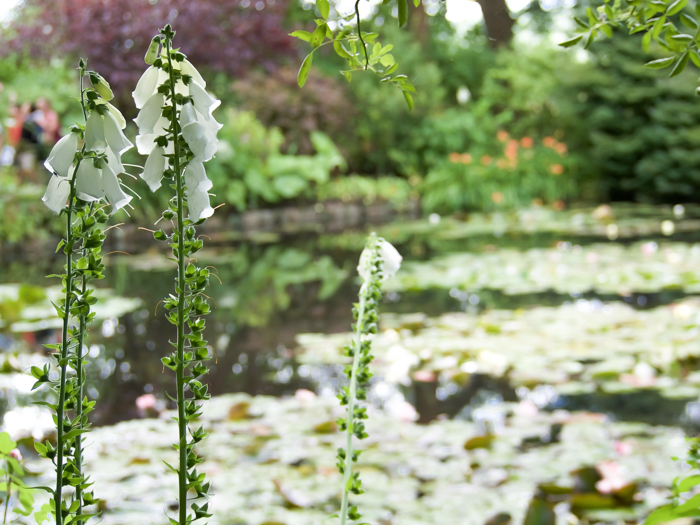
To help inspire his work, he diverted water from a nearby source and planted his own water lilies. Monet was also obsessed with perfection. (He once destroyed 15 of his Water Lilies in a perfectionist rage.)
And he was obsessed with natural light, painting as fiercely and frantically as possible to capture an exact moment before it passes which, as science has taught us, is impossible without Instagram.
While in Normandy you should definitely check out the best of Normandy’s D-Day sites. The experience is unlike anything else you’ve ever experienced on your travels, I promise.
Day trip to Giverny from Paris: How to get there
Ahh, so you’re visiting Paris. Now get out. Leaving the city and taking a day trip to Giverny is among the most popular things to do when visiting Paris, right up there with taking selfies in front of the Eiffel Tower and taking selfies in front of the Mona Lisa.
How long does it take to get to Giverny from Paris?
Giverny is just one hour northwest of Paris by car or 14 hours if you choose to walk because automobiles are so bourgeouis.

A day trip to Giverny is a great opportunity to get some background on, like, all the paintings you’ll see in the Paris museums. (probably my favorite thing about my line of work is being able to shout, “I’ve been there!” on an annoyingly regular basis)
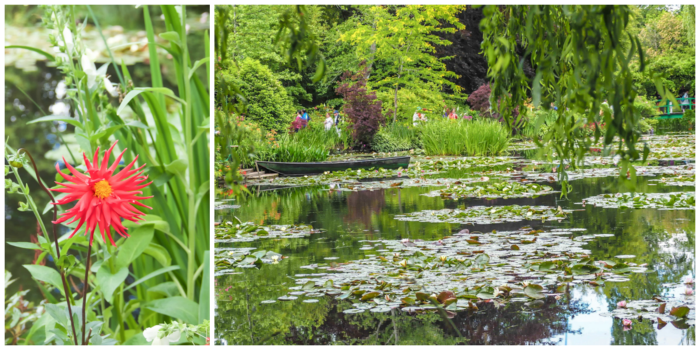
Visit Giverny on a day tour from Paris
My recommendation—because it’s what I did—is to take your day trip to Giverny via an organized, guided tour. For the love of lilies, let someone else handle tickets and transportation so you don’t have to.
Plus, these tours usually come with skip-the-line abilities and, visiting Paris and Giverny in the summer, this is worth its weight in goldenrod. You also get private and direct transportation and knowledgeable tour guides who probably know their Phlomis purpurea from their Phlomis italica. Maybe?
It is possible to get from Paris to Giverny independently—check this and/or this page for logistics—but the trip will take much more than an hour, includes the cumbersome combination of metro ⇢ train ⇢ bus ⇢ feet, and the schedules of each of those are less ideal than planting tulips in the spring! Ha! Can you imagine!? Garden snobs, you know what I mean.
The Best Day tours to Giverny from Paris
Here are a few great guided tour options for your day trip to Giverny:
Versailles & Giverny Day Trip with Lunch from Paris
This uber-popular 9.5-hour tour includes a trip to the Palace of Versailles (another Paris must) as well as a day trip to Giverny, plus lunch.
Giverny & Monet’s Gardens Small-Group Half-Day Trip
This 5-hour tour is limited to just 8 people and is super informative. It includes visual aids (!!!) and even takes you to Monet’s burial site.
Monet's House & Gardens Self Guided Tour with Transport from Paris
This tour includes transportation, admission, and an audio guide but your time to explore is all your own. (And it costs less than transportation alone if you were to do this without a tour.)
Giverny & Monet's Garden by Train
Perhaps you'd like to visit Giverny the same way Monet did - by riding the rails. This tour includes skip-the-line admission into Monet's House and Gardens and round-trip transportation by train.
Other Giverny day trips from Paris
There are actually many more Paris tour combinations for Giverny and you can find those all here. Find one that fits you best!
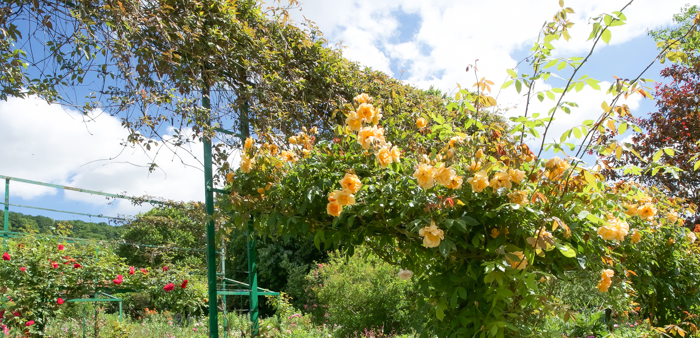
When is the best time for a day trip to Giverny?
Because of the nature (heh) of this site, a day trip to Giverny can only be taken at certain times of the year. Monet’s house and gardens at Giverny are only open seven months of the year: late March – November 1st, because, duh, flowers. Besides, visiting a garden in the winter would be about as worthwhile as having vegan bacon with a side of O’Doul’s for lunch.
As for when exactly to go during that time… well, this place is so full of beautiful, colorful growing things that visiting any time during those seven months is going to be worthwhile.
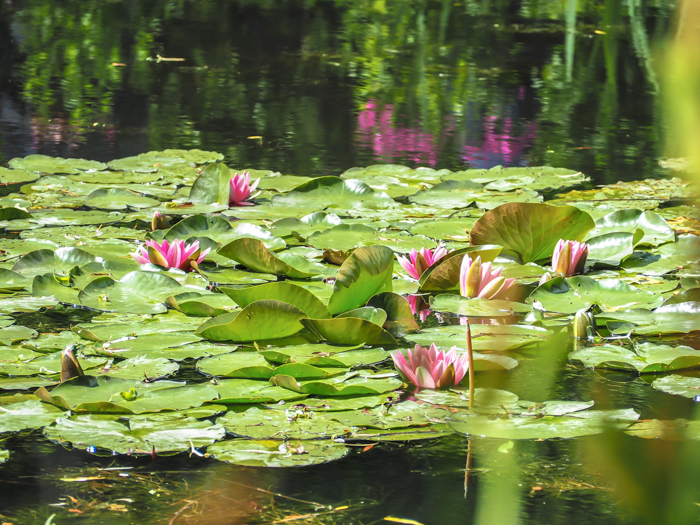
When to go to Giverny to see water lilies
But let’s be real here; you came for the water lilies, didn’t you! Water lilies as a species bloom between May and September, however, both the Giverny website and our tour guide told us the lilies at Giverny don’t typically bloom until July and we might not get to see them.
Well, well, well, the pictures in this post were taken on my early June visit and clearly the nympheas showed up to play.
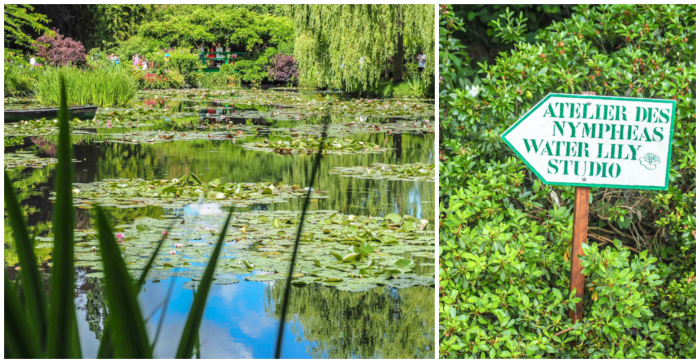
When to go to Giverny to see wisteria
If July is out of the question for your day trip to Giverny, my recommended backup plan would be to visit in May when Monet’s famous Japanese bridge is drenched in flowering purple wisteria. Look at this OMG
But, hell, maybe you hate both and actually get your jollies from holly-hocks or busy-lizzies. Worry not, there’s a Giverny flowering calendar for that.
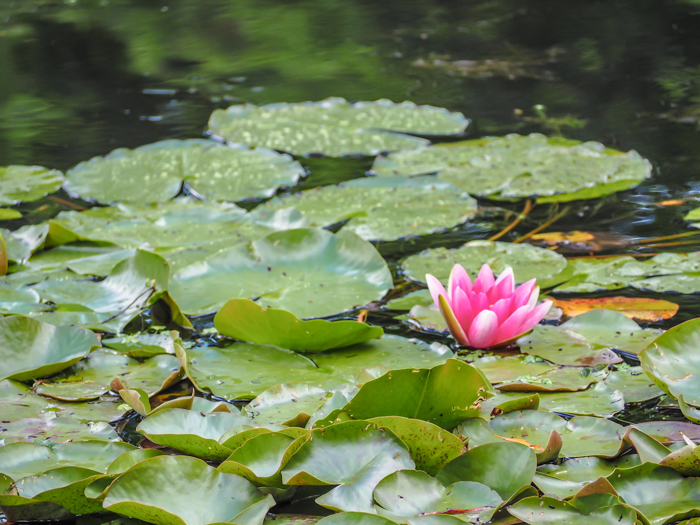
What to see on a day trip to Giverny
A day trip to Giverny is all about Claude Monet. You’ll visit his house, his garden, his famous water lily pond. You’ll see his chickens, his cows, his jealousy-inducing collection of copper cookware. Wow, I am not sounding cool today.
Monet’s house and studio
Monet lived at his house in Giverny for 43 years, the size of which defies everything I thought I knew about painting as a lucrative career path. Monet lived here with his lady-friend Alice and their combined eight children. I think the mystery of his eventual madness has solved itself.
Here at his house you can tour his bedrooms, kitchen, studio, bathroom, and many other places in which he’d be totally uncomfortable entertaining visitors. And as large as the house is, it’s still tight and you will be bumper to bumper on Fanny Pack Ave.
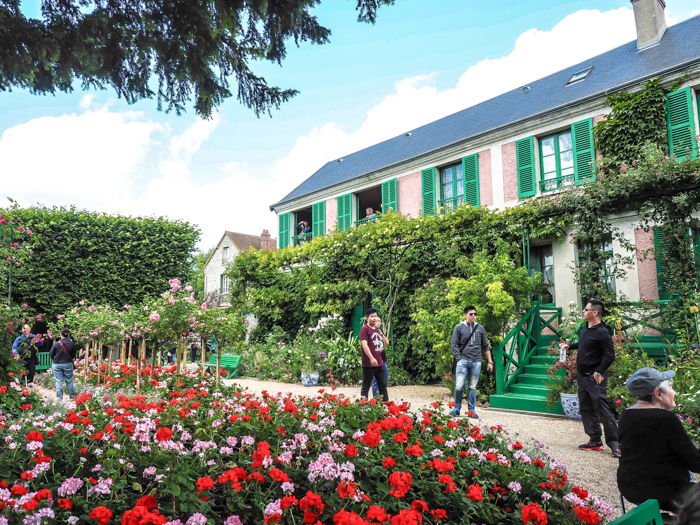
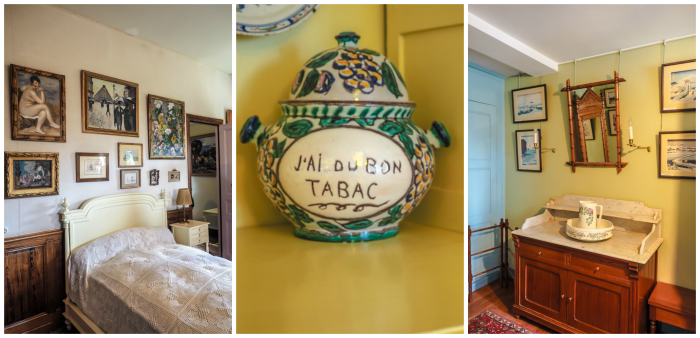

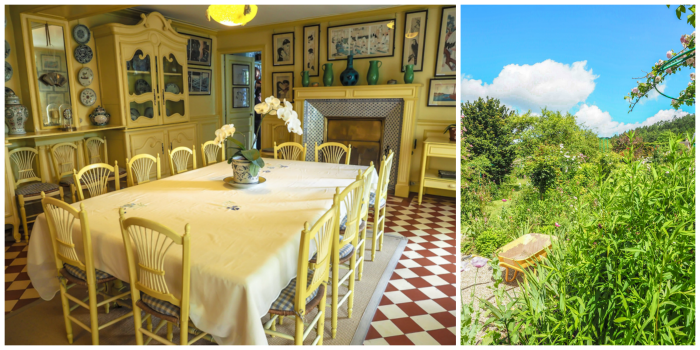
Monet’s gardens
There are 100 varieties of flowers and trees in the garden of the man who was quoted as saying, “Apart from painting and gardening, I’m not good at anything.” So if his success at painting is any indicator, I think you know what you can expect in his anything-but-ho-hum garden.
During your day trip to Giverny you’re free to wander throughout his garden, on strictly marked paths of course, and take it all in through your nose. I mean it; smell all of them.
Be warned that the garden is almost overwhelming as it’s so full and tightly packed, and everything is taller and more feminine than you. Monet also said, “My garden is my most beautiful masterpiece.”
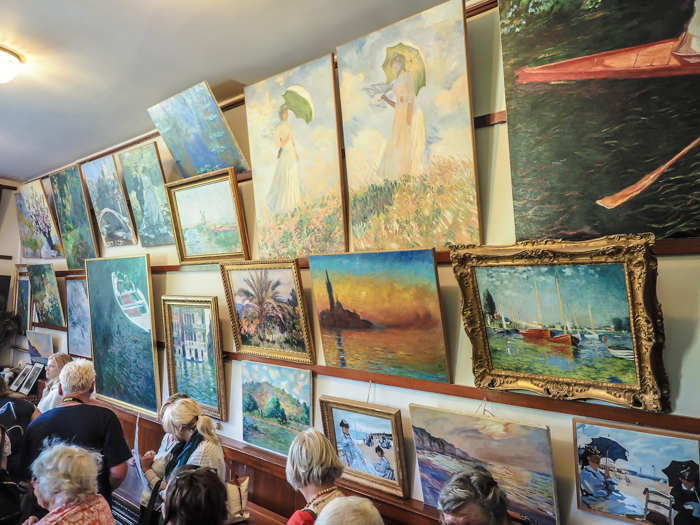
Monet’s pond
Monet’s pond is the highlight of his property and where you can find his famous water lilies—in bloom or otherwise. Now every time you see a Water Lilies painting you can shout, “I’ve been there!” but do so internally because museums.
You can circle the entire pond and walk across the Japanese bridge, see the little boat he used to paddle around in (before paddling around in little boats was cool, obvs) and, if you’re lucky, maybe even fall in because there is legit no barrier whatsoever.
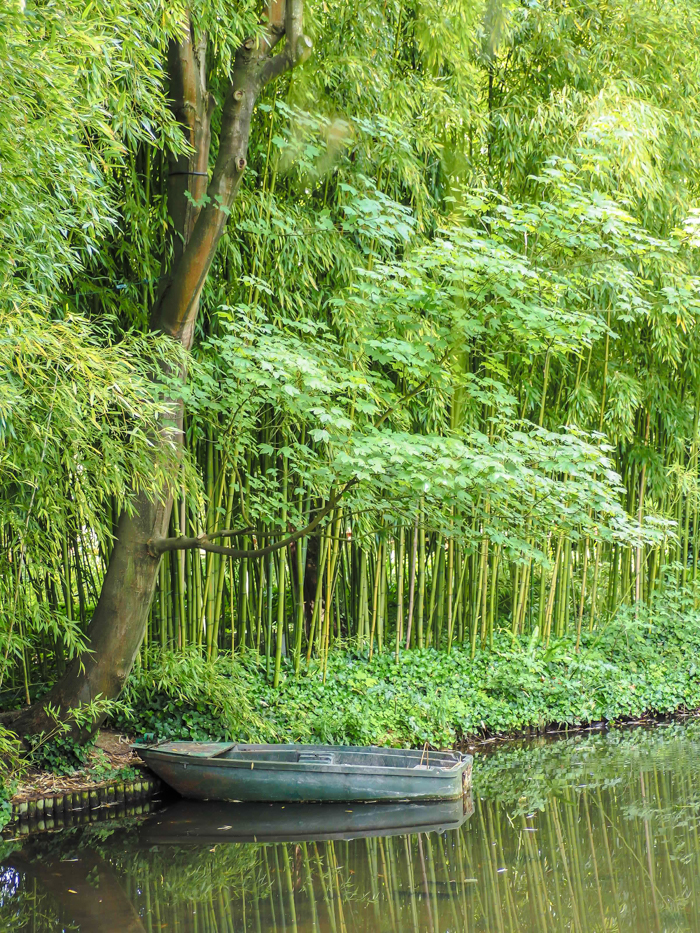

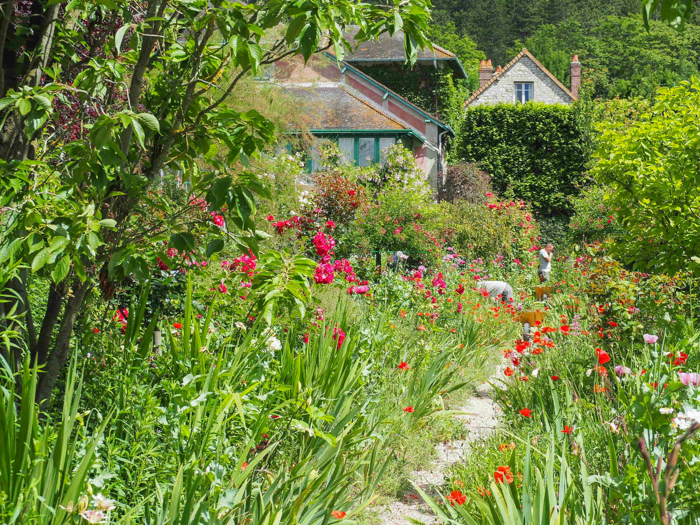
What to bring on a day trip to Giverny
Allergy medicine
Maybe your allergies are fine at home, but you probably don’t have 100 varieties of pollen-producing perennials surrounding your digs—some of them you’ve never been exposed to. Chances are you’re allergic to one of them because you are, in fact, of the human species.
Don’t forget the allergy medicine when you travel to a place literally to be surrounded by flowers. Wouldn’t sneezing and falling into a totally unbarricaded pond be the perfect allergy medicine commercial though?
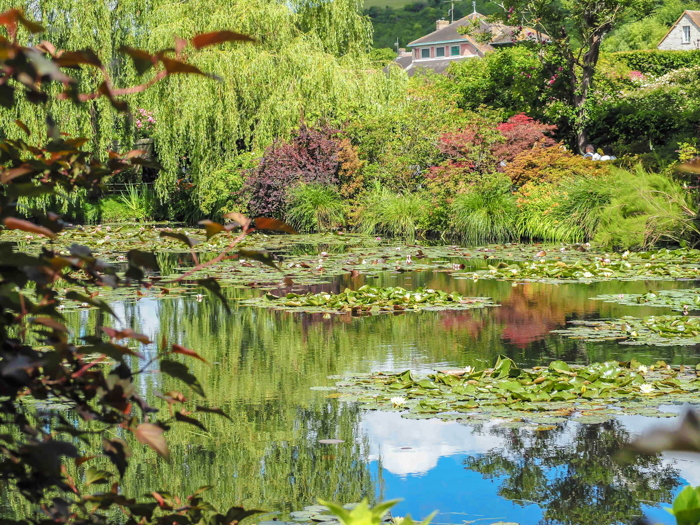
Remember to opt for something that won’t put you to sleep. For me that means running as far away from Benadryl as possible and straight into the arms of Zyrtec. But damn, Benadryl certainly works. (Don’t forget to pack some tissues too.)
*I think legally I’m supposed to say here that I’m not a doctor? But you already knew that from earlier when I referred to Instagram as “science”. Wouldn’t conking out and falling into a totally unbarricaded pond be the perfect non-drowsy allergy medicine commercial though?
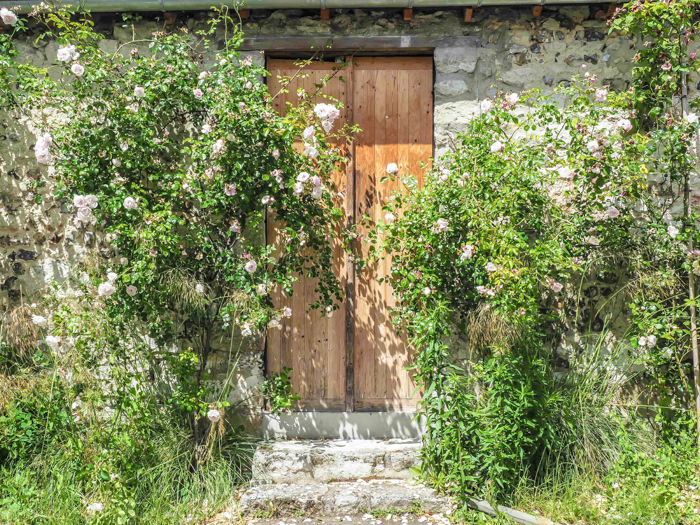

Guidebook(s)
I’m a stickler for two things: always eat where the line is longest, and always get the guidebook.
Guidebooks give great commentary, historical background, essential logistical, time, and cost information, and yeah, often even where to find the food source with the longest line, ergo, the best grub. I personally recommend:
- The Rough Guide to Brittany and Normandy – (Yes, Giverny is actually in Normandy.) Because what are we doing, class? Getting outta Paris! But since you will be in Paris…
- The Rough Guide to Paris – Or get one that has it all…
- Fodor’s Essential France – Covering it all (including Paris and a day trip to Giverny) and with a handy pull-out map. Wouldn’t falling into a pond while reading a handy pull-out map be just the funniest?
- Rick Steves France is a great option too.
- AND, I always recommend these pocket-sized customs and culture guides for all international trips. Check out Culture Smart France here. (And check out my full review of Culture Smart’s books if you want to learn more about them.)
Camera
Your day trip to Giverny and the water lily pond is a thing of rare beauty. A chance to photograph, blow up, frame, and brag about having a real (ehh, not real) Monet hanging up in your living room. Do not come to Giverny without a great camera.
A few more essentials
Here are a few more essentials you may want to bring on your day trip to Giverny:
- A decent pair of polarized sunglasses so you can see all the beauty
- Sunscreen since you’ll be visiting in the summer
- Perhaps a light, packable sun hat too
- Comfortable outdoor walking shoes – I swear by both Teva sandals and Chacos and that’s just about all I wear on trips like this. You can get them here on Zappos with free shipping and free returns.
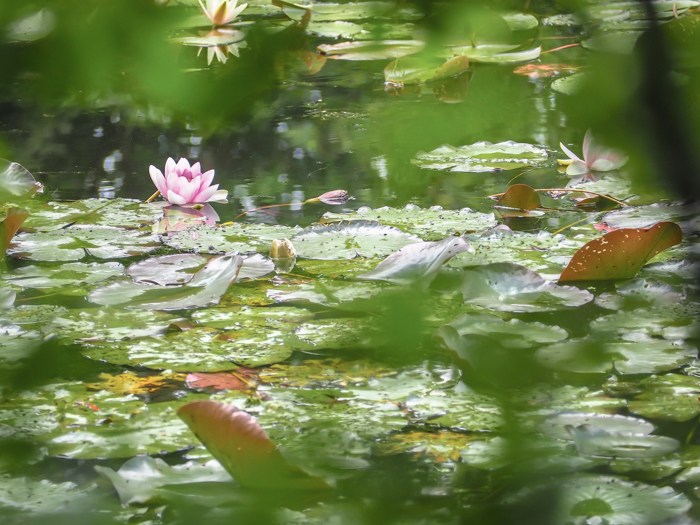

Book to Read for Your Day trip to Giverny
Before I travel anywhere new, I always do my best to get my read on. This way, when I see something I’ve read about I can shout, “I just read about that!” because if the world doesn’t know how awesome you are, are you even awesome?
Along with guidebooks, this is a great way to be able to put everything you’ll see into perspective when you see it—historically, biographically, immediately. Here are my recommendations for books to read for your day trip to Giverny:
Mad Enchantment: Claude Monet and the Painting of the Water Lilies by Ross King
I talk about Ross King all. the. time. when it comes to reading before a trip to Europe. He specializes in writing actually entertaining biographies of European artists and their lives. He also covers what’s happening in that place at that time to give great context and you learn so much.
Everything I’ve written in this post about Monet and Giverny I learned from this book. Does that make me sound like I’m coming to terms with my adult-ness? Because I’m not.
The Judgment of Paris: The Revolutionary Decade That Gave the World Impressionism by Ross King
Alright, I haven’t read this one yet but it’s sitting on the bookshelf in front of me as we speak. This one goes beyond the work of Monet and covers the movement of Impressionism and its most popular characters as a whole.
Dover Masterworks: Color Your Own Monet Paintings
Okay, so there’s not a whole lot of reading required here but I’m totally buying this.
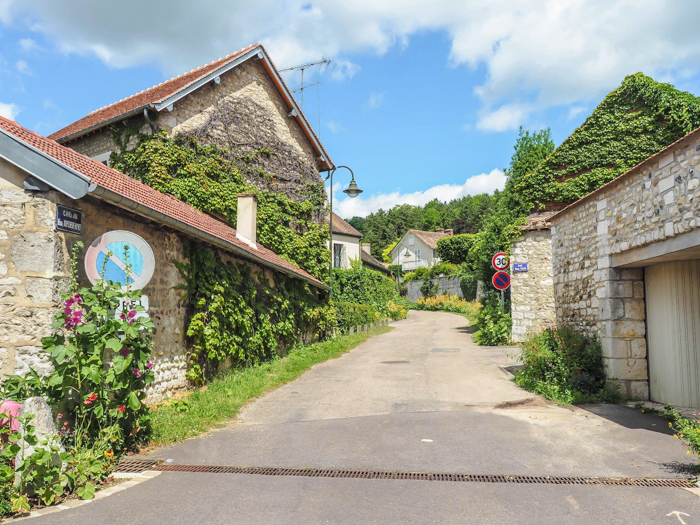
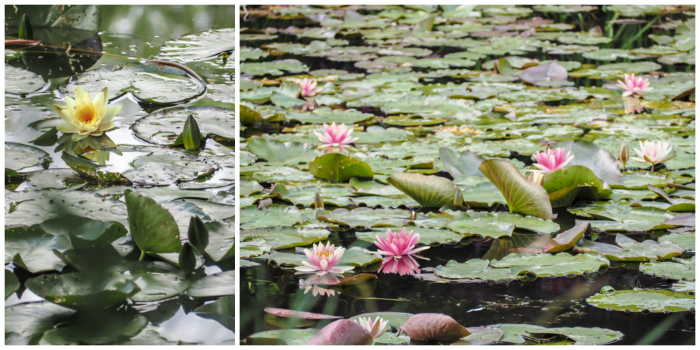
Where to find Monet’s Water Lilies
Well, let me put it this way: I don’t think I’ve been to an art museum that hasn’t had one of Monet’s Water Lilies on display. This Water Lilies Wikipedia page does an okay job of listing where many of them can be found but chances are if you visit a fine art museum or a modern art museum or a western art museum you’ll fall into a water lily pond.
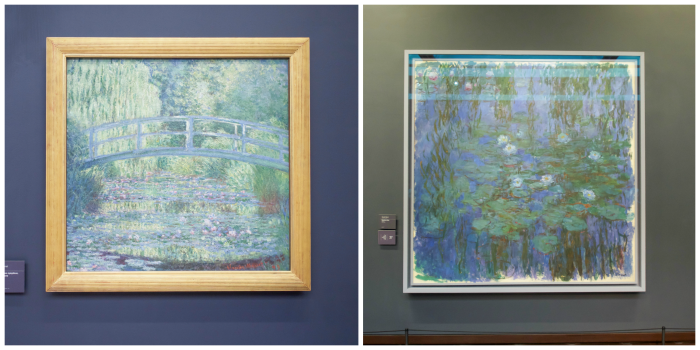

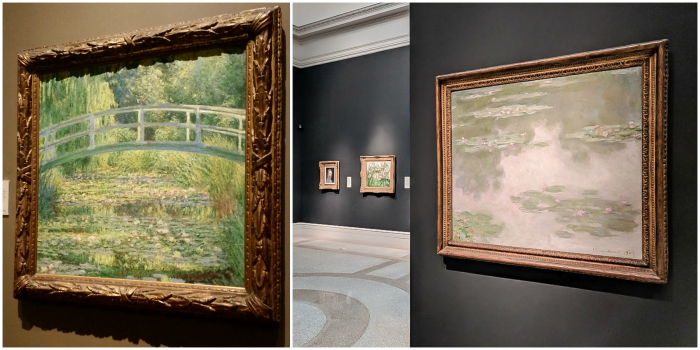
…but nowhere will you find an explanation for why I take photos of these every. single. time. I’m chocking it up to: “I’ve been there!”
More info for your day trip to Giverny
- Heading to Paris? Find great places to stay on Booking.com and Expedia.
- Driving to Giverny? Check out the best local rental car deals here.
- Keep yourself and your belongings safe in Paris with these must-pack safety items.
- What else have I covered in France? See more posts here.
Save this info, pin this image:


